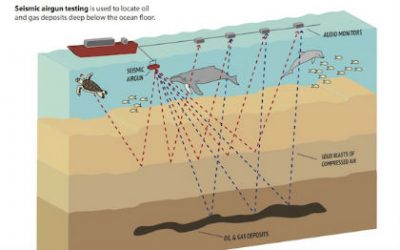RALEIGH – The N.C. General Assembly will start the new year with a few new faces, but the script will largely remain the same.
When both chambers are gaveled to work at 9 a.m. on Wednesday, members will hold a couple of ceremonial votes, hear a few speeches and then adjourn to spend the better part of January organizing committees for the long session ahead, the centerpiece of which will be a fresh state budget.
Supporter Spotlight
The 2015 environmental agenda will also look familiar because most of those chosen to leadership roles when Republicans took control in 2011 are expected to remain. With them come their priorities.
For the coast that likely means the continued pursuit of offshore oil and natural gas exploration, a rollback of rules and regulatory enforcement under the guise of “reform,” finding money for inlet dredging and beach re-nourishment, and development of a long-term solution for Oregon Inlet and N.C.12.
While that’s at least a partial list of the key issues, how and when they’ll come up is still an unknown as the House, and possibly the Senate, shifts committee chairs and composition. On Wednesday, the House is expected to elect Tim Moore, R-Cleveland, as its next Speaker. He’ll replace Thom Tillis, who was elected last year to the U.S. Senate.

During previous sessions since the Republican takeover, environmental advocates relied on House leaders for help dialing back some Senate budget cuts and more aggressive proposals on fracking and other environmental issues. Whether that good-cop, bad-cop dynamic remains in place is up in the air.
Two central players in environmental legislation in the House, Ruth Samuelson and Tim Moffitt, will no longer be around. Samuelson, a Repulican from Mecklenberg County, who co-chaired the Environmental Review Commission, retired. Moffitt, a Republican from Buncombe, lost his re-election bid.
Supporter Spotlight
Another unknown this session is the effect of Dare County Rep. Paul Tine’s recent switch from Democratic to unaffiliated. He will caucus with Republicans.
Cassie Gavin, director of Government Relations for the N.C. Chapter of the Sierra Club, said it will be hard to get a read on the House leadership under the new speaker, until committee chairs and membership are sorted out.
“Right now, it’s hard to tell the direction the House is going,” she said.
It’s also unclear, she said, how the change at the top of the state Department of Environment and Natural Resources, or DENR, might affect the department’s budget priorities.

Last month, Gov. Pat McCrory appointed Donald van der Vaart, a career administrator in the department and its chief energy policy advisor, as DENR secretary. He replaces John Skvarla, who replaced Sharon Decker as secretary of Commerce in November.
Grady McCallie, policy director for the N.C. Conservation Network, said there’s a strong interest in what happens as van der Vaart assumes control of the department, especially during what is expected to be a tight budget year.
“One thing to watch for is whether there’ll be a shakeup in his staff,” he said.
Another key item will be whether the communication flow within the department improves. Under Skvarla, McCallie said, “You would hear over and over again from people in the department that there’s not much information flowing from the secretary’s office to the front-line staff,” he said. “The staff would often seem out of the loop.”
Controversies Ahead
Proposals to move ahead with fracking have dominated much of the environmental debate during the past several sessions. It was eclipsed last year by the legislative response to a major coal ash spill.
But debate over another issue at the nexus of energy and environmental policy has been building, and 2015 could see the outbreak of a major fight over offshore exploration for oil and natural gas.
Although it has not gotten the attention of fracking and coal ash, recent legislation has paved the way for a state-led effort to encourage offshore exploration and state backing for the infrastructure needed onshore to support it.

In mid-November, McCrory and DENR officials, led by van der Vaart, hosted a day-long look at offshore oil and gas potential with state and federal officials. The closed-door symposium, which also included policymakers and legislative staff from South Carolina and Virginia, was criticized for including presentations from industry-friendly trade groups, while shutting out the press and members of environmental organizations.
In a press conference afterwards, McCrory said he wants to see the state move forward to encourage offshore testing. And he plans to seek changes to an oil and gas royalty plan passed by the legislature last year to include greater benefits to coastal communities should any federal royalties materialize.
Rep. Pricey Harrison, D-Guilford, said it’s clear from the conference and recent legislative efforts that the governor and legislative leaders are pushing an oil and gas agenda, something she says is a move in the wrong direction given concerns about climate change, the state’s recent jump in green energy jobs and declining oil and natural gas prices.
“It doesn’t make any sense to pursue a strategy of offshore exploration,” she said.
With most of the exploration decisions in the hands of the federal government, Harrison said she doesn’t expect major oil and gas legislation, but at least some attempts to smooth the way for exploration.
Further evidence of a brewing battle over offshore exploration happens Wednesday, just after the official opening of the session, when a coalition of environmental groups plan to announce a coordinated response to offshore exploration, including the release of a new study comparing job creation and economic benefits of developing offshore wind energy versus oil and gas development.
Oil and gas exploration advocates have their own study to point to this session as well in a new Department of Commerce report to the legislature on economic benefits of a potential liquefied natural gas export terminal. The report, mandated last year by the legislature and released Jan. 1, says if it were to be built at state ports in Morehead City or Wilmington, the terminal could generate thousands of construction jobs and several hundred permanent position.

Another expected energy-related flashpoint is what to do with renewable energy tax credits, which are set to expire at the end of the year.
Harrison said while legislative leaders have gone on record against the credits, recent attempts to eliminate them have failed, thanks to a coalition of businesses, farmers and communities that have benefitted by the growth in green jobs.
“Right now, there seems to be less of an appetite for repealing [the credits],” she said.
Gavin said she also expects there to be some attempt to end the credits, but with the state’s solar industry growing at one of the fastest rates in the nation there’s a strong case for continuing the credits.
“It’s going to be tough to get [the credits] extended given the current climate,” she said. “But without it things could slow down considerably.”
Risky Business
McCallie said he’s also keeping an eye out for another potential shift in how the state handles cleanup of contaminated sites.
DENR recently completed a legislature-mandated report on risk remediation, he said, but it has yet to be released or sent on to legislators for consideration.
McCallie said the concern is that the legislature will use the report to ease rules on owners of contaminated property, a change that could lead polluters to get out of cleanup requirements. The move to a risk-mediation system is backed by a coalition of the state’s manufacturers.
While the change might help some landowners develop or reuse some of the thousands of contaminated properties in the state, McCallie said it could lead others to think they could get away with not having to cleanup sites.

“It creates an incentive not to do that,” he said.
While the heavy lifting on most of these issues won’t restart until budget and policy committees resume regular meetings later this month, some work has already started.
The committee overseeing the process for an ongoing major review of all state rules is scheduled to hold its first meeting of the year this morning.
Early in last year’s session the Joint Legislative Administrative Procedure Oversight Committee approved a revision to the process that ensured that nearly all of the state’s major environmental rules would not only have to go back through the re-approval process, but would also face additional legislative scrutiny.
The committee has yet to release its agenda for the session, but McCallie and others expect the legislature to continue to tweak the rules process.
Work on the massive review of all state rules has been complicated by a lawsuit filed late last year challenging the constitutionality of the Rules Review Commission. The commission is appointed by the legislature and has final say on state rules. The lawsuit, filed on behalf of the State Board of Education, claims that since drafting and enforcement of rules are an executive branch function the commission violates the state constitution’s separation of powers requirements.
The challenge is one of a handful of lawsuits challenging similarly organized state boards. In mid-November, Gov. Pat McCory, joined by former governors Jim Martin and Jim Hunt, filed suit challenging the constitutionality of the state Coal Ash Management Commission. And earlier this month, the Southern Environmental Law Center filed suit challenging the constitutionality of the state’s Mining and Energy Commission, which recently approved a set of new rules on fracking.
Stay tuned for the legislative response.
A Q&A With Rep. Paul Tine
1. What are your priorities in terms of coastal issues going in to the session?

There are several coastal issues that need to be looked at in the next session. The first is access. We have access issues up and down the coast from highway 12 and Bonner Bridge, to ferry toll,to our inlets shoaling up. Establishing some short term fixes while developing some long range funding sources is essential. In regards to water quality, I am very excited about some programs being developed for oyster fisheries that will increase water quality and establish a sustainable food source, while putting people back to work. We also must do something to make sure our insurance rates are fair and equitable. I believe the first step in this process is to bring more transparency and better information to the rate making process.
2. Last session we saw a few surprises in the budget process — Jennettes Pier comes to mind — and the inclusion of a major provision on Oregon Inlet. What will you be keeping an eye on in the budget process?
Education and transportation funding are the two big items that I will be watching during the budget process. We need to make sure that we are continuing to invest in every region of the state so that we have access to markets and a well trained workforce no matter where you live in North Carolina.
3. How do you think your change of caucus will affect your involvement in the legislative process?
My hope is that I will have the opportunity to develop balanced policy by providing input throughout the process.
4. Any ideas of committee assignments and/or hope for a particular assignment?
I have expressed the desire to work on the committees that most greatly affect my district. That includes transportation, education, insurance and commerce. I don’t know yet to which committees the Speaker elect will be assigning me.







